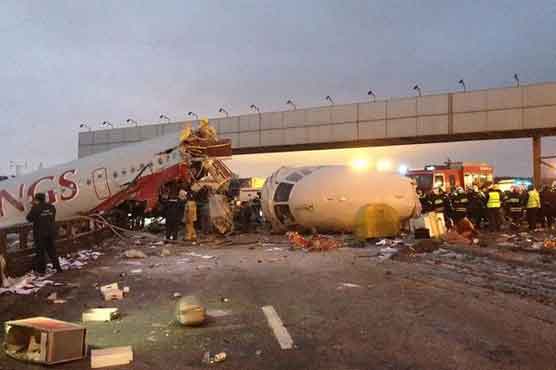Russia probes Moscow plane crash

Rescue workers recovered the flight recorders.
MOSCOW: Russian medics began Sunday identifying the bodies of four crew killed when a passenger jet careened off the runway of a Moscow international airport and smashed into a highway.
Rescue workers recovered the flight recorders from the four-year-old Tu-204 of tycoon Alexander Lebedev's Red Wings airlines late Saturday as Russia began mourning its latest post-Soviet crash.
"The plane touched down in the proper landing area but for some reason was unable to stop on the strip," Federal Air Transport Agency chief Alexander Neradko said in televised remarks.
A bigger loss of life was only averted because the 210-seat liner was empty except for eight crew on their return from a charter flight to the Czech Republic.
Cell phone footage of the accident posted online showed chunks of debris hurtling over the highway and crashing into cars whose drivers had to swerve and make emergency stops.
The jet split into three pieces and required the temporary shutdown of both the Kiev Highway and Vnukovo -- Moscow's third largest airport and the site of a special terminal for Kremlin officials.
A security source said investigators had brushed aside poor weather conditions or pilot error and were focusing on technical problems with the Tupolev as the most likely cause.
"According to preliminary information, the Vnukovo catastrophe may have been caused by problems with the plane, which became exposed in difficult weather conditions," the unnamed official told the Interfax news agency.
Witnesses said heavy gusts accompanying a light snowfall were swirling over the airport at the time the plane came in for landing on Saturday at 4:45 pm (1245 GMT).
Red Wings owner Lebedev -- a billionaire famous for his critical view of the Kremlin and his ownership of the London Evening Standard and The Independent in Britain -- said the jet had recently passed a meticulous check.
"Plane number 47 had accumulated 8,500 flight hours and underwent its last serious check on November 23," Lebedev tweeted.
He also suggested that traffic controllers' initial refusal to authorise landing -- requiring the plane to complete several circles over Vnukovo -- may have been a contributing factor.
"All machinery has its limits, even when it is new," Lebedev wrote.
Several state media outlets speculated only hours after the incident that something may be wrong with the brake system of the entire line of Tu-204 planes.
They cited a letter sent by the state aviation watchdog Rosaviatsya to the jet's maker on Friday asking about an incident last week in which the engines refused to fire into reverse on landing.
The manoeuvre is required for the plane to slow down quickly upon touchdown.
The russianplanes.net aviation website said the very same jet had suffered an engine failure and was forced to make an emergency landing in June 2009.
Smoke could be seen coming out of the Tupolev's right engine after Saturday's incident.
Russianplanes.net said Lebedev's airline had in fact decided not to order any more Tu-204 planes after the 2009 episode because of the engine concerns.
The latest line of Tupolev jets were developed in the late Soviet era as the preferred replacement for the workhorse Tu-154 liner that still dominates Russian skies.
But only 50 or so of the more modern versions of Tupolev are in operation because of slow orders and continuing efforts to modernise the jet's engines.
The planes that do fly are most often used by charter companies -- both private and those belonging to the state.
A spokesman for the Russian Football Union said the national squad used the plane that crashed on Saturday for its flights to away matches in 2009-2010.
One photograph published online showed the Russian Football Union's insignia appearing on one of the segments of the plane's debris.
Russia has experienced a recent surge of air accidents caused by ageing equipment and poor maintenance work conducted by small and largely unregulated airlines that now dot the vast country.
The emergencies ministry says that some 200 Russians have died in air disasters in the past two years alone.


